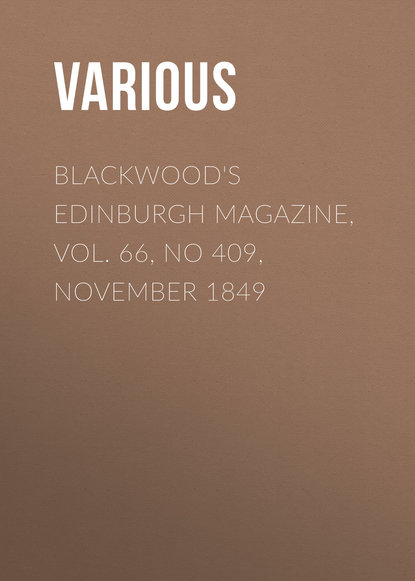По всем вопросам обращайтесь на: info@litportal.ru
(©) 2003-2024.
✖
Blackwood's Edinburgh Magazine, Vol. 66, No 409, November 1849
Автор
Год написания книги
2017
Настройки чтения
Размер шрифта
Высота строк
Поля
BULLER.
That must be a deluge of – hail.
TALBOYS.
So much the better. Hitherto we have had but rain. "Mysterious horrors! Hail!"
"'Twas a rough night.
My young remembrance cannot parallel
A fellow to it."
NORTH.
Suppose we resume yesterday's conversation?
TALBOYS.
By all manner of means. Let's sit close – and speak loud – else all will be dumb show. The whole world's one waterfall.
NORTH.
Take up Knight on Taste. Look at the dog-ear.
TALBOYS.
"The most perfect instance of this kind is the Tragedy of Macbeth, in which the character of an ungrateful traitor, murderer, usurper, and tyrant, is made in the highest degree interesting by the sublime flashes of generosity, magnanimity, courage, and tenderness, which continually burst forth in the manly but ineffective struggle of every exalted quality that can dignify and adorn the human mind, first against the allurements of ambition, and afterwards against the pangs of remorse and horrors of despair. Though his wife has been the cause of all his crimes and sufferings, neither the agony of his distress, nor the fury of his rage, ever draw from him an angry word, or upbraiding expression towards her; but even when, at her instigation, he is about to add the murder of his friend and late colleague to that of his sovereign, kinsman, and benefactor, he is chiefly anxious that she should not share the guilt of his blood: – 'Be innocent of the knowledge, dearest chuck! till thou applaud the deed.' How much more real grandeur and exaltation of character is displayed in one such simple expression from the heart, than in all the laboured pomp of rhetorical amplification."
NORTH.
What think you of that, Talboys?
TALBOYS.
Why, like much of the cant of criticism, it sounds at once queer and commonplace. I seem to have heard it before many thousand times, and yet never to have heard it at all till this moment.
NORTH.
Seward?
SEWARD.
Full of audacious assertions, that can be forgiven but in the belief that Payne Knight had never read the tragedy, even with the most ordinary attention.
NORTH.
Buller?
BULLER.
Cursed nonsense. Beg pardon, sir – sink cursed – mere nonsense – out and out nonsense – nonsense by itself nonsense.
NORTH.
How so?
BULLER.
A foolish libel on Shakspeare. Was he the man to make the character of an ungrateful traitor, murderer, usurper, and tyrant, interesting by sublime flashes of generosity, magnanimity, courage, and tenderness, and – do I repeat the words correctly? – of every exalted quality that can dignify and adorn the human mind.
NORTH.
Buller – keep up that face – you are positively beautiful —
BULLER.
No quizzing – I am ugly – but I have a good figure – look at that leg, sir!
NORTH.
I prefer the other.
TALBOYS.
There have been Poets among us who fain would – if they could – have so violated nature; but their fabrications have been felt to be falsehoods – and no quackery may resuscitate drowned lies.
NORTH.
Shakspeare nowhere insists on the virtues of Macbeth – he leaves their measure indeterminate. That the villain may have had some good points we are all willing to believe – few people are without them; – nor have I any quarrel with those who believe he had high qualities, and is corrupted by ambition. But what high qualities had he shown before Shakspeare sets him personally before us to judge for ourselves? Valour – courage – intrepidity – call it what you will – Martial Virtue —
"For brave Macbeth, (well he deserves that name,)
Disdaining fortune, with his brandished steel,
Which smoked with bloody execution
Like valour's minion,
Carved out his passage till he faced the slave;
And ne'er shook hands, nor bade farewell to him,
Till he unseam'd him from the nave to the chaps,
And fixed his head upon our battlements."
The "bleeding Serjeant" pursues his panegyric till he grows faint – and is led off speechless; others take it up – and we are thus – and in other ways – prepared to look on Macbeth as a paragon of bravery, loyalty, and patriotism.
TALBOYS.
So had seemed Cawdor.
NORTH.
Good. Shakspeare sets Macbeth before us under the most imposing circumstances of a warlike age; but of his inner character as yet he has told us nothing – we are to find that out for ourselves during the Drama. If there be sublime flashes of generosity, magnanimity, and every exalted virtue, we have eyes to see, unless indeed blinded by the lightning – and if the sublime flashes be frequent, and the struggle of every exalted quality that can adorn the human mind, though ineffectual, yet strong – why, then, we must not only pity and forgive, but admire and love the "traitor, murderer, usurper, and tyrant," with all the poetical and philosophical fervour of that amiable enthusiast, Mr Payne Knight.











